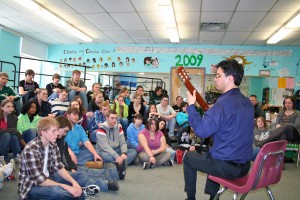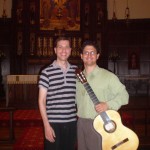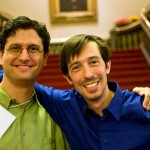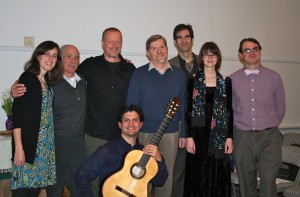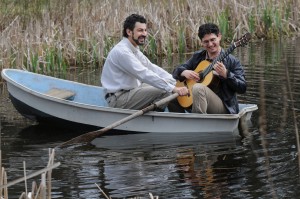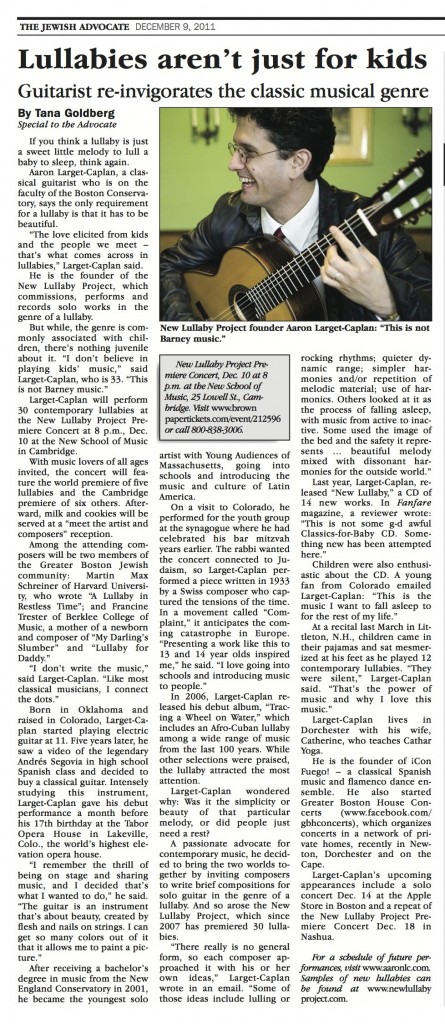New Lullaby Project Premiere Concert
December 10, 2011 • New School of Music
Aaron Larget-Caplan, guitar
Program:
Wiegenlied (2011) Thomas Schuttenhelm
The Moon Through The Window Shines Down (2009) Thomas L. Read
Lullaby in Three Voices (2011) Alan Fletcher
Song for Daddy* (2011) Francine Trester
Cancion de Cuna* (2010) Hayg Boyadjian
Upward* (2011) John McDonald
Whispers (2011) Canary Burton
A Lullaby for Restless Times* (2010) Martin Schreiner
Little Dancer (2010) Michael Veloso
After Many Days Without Rain (2011) Patricia Julien
Lulubye (2011) Jacob Mashak
A Child Sings at Thanksgiving *(2010) Demetrius Spaneas
* World Premiere
Tonight’s concert features the premiere of New Lullabies numbers 26-30.
Special Thanks to Catherine Larget-Caplan, Caroline Larget, all of the composers, and all of the the active listeners and supporters.
About the Performer
Aaron Larget-Caplan is a guitarist and educator. He has commissioned dozens of new compositions for guitar. His solo albums include New Lullaby (2010) and Tracing a Wheel on Water (2006). He is also featured on the CDs Vientos – Music of Hayg Boyadjian (Albany, 2010) and Classic American Songs (2011) with baritone Donald Wilkinson. His latest release is a digital single of George Gershwin’s “Summertime” arranged by Toru Takemitsu. Aaron founded the New Lullaby Project in 2006. He teaches at Boston Conservatory and has an active private studio in Boston. Visit his website at AaronLC.com.
Composer Biographies & Program Notes
Thomas Schuttenhelm is an American composer and guitarist whose compositions exhibit an exquisite craft and richness of style and are celebrated by many leading artists in contemporary music. His compositions can be heard on numerous recordings and have been performed throughout the country and abroad by a broad range of artists. He has performed with the FIREWORKS Ensemble, Purple Rock Productions, and the Boston Public Works Contemporary Music Series. In addition to his creative and performance career he is active as a scholar and has lectured at numerous universities in the UK, Germany, and in the US. In 2007 he was the recipient of a Fulbright Fellowship to the U.K. and he is currently completing his second book Meaning and Identity in the Orchestral Music of Michael Tippett for Cambridge University Press.
Weigenlied (Ger. Lullaby) is a brief but significant work. Its quietness and delicate textures stand in opposition to the aggression and excessive violence that too easily overtake our attention. Short and contemplative, it is nonetheless developmental and many of the technical aspects could have programmatic subtexts: the ¾ ‘rocking’ rhythms, the transparent harmonics (child) heard above (in context of) the more ‘solid’ roots or fundamentals (parent), and even the descending or falling lines (as in falling to sleep). Perhaps most importantly, it affirms Mr. Larget-Caplan’s broader mission of commissioning and collecting works that have these qualities, and thus buck trendiness in favor of creating a new tradition.
Premiered at First Parish Cohasset, May 15, 2011
Thomas L. Read
The Moon Through The Window Shines Down
Premiered at Salem State University on November 1, 2010
Alan Fletcher is President and CEO of the Aspen Music Festival and School and a respected composer. He holds doctoral and masters degrees from The Juilliard School and a bachelor’s degree from Princeton University, and has studied with distinguished composers such as Roger Sessions, Milton Babbitt, Edward T. Cone, and Paul Lansky, and pianists Robert Helps and Jacob Lateiner. He has won numerous composing awards and commissions, including recent commissions for the Pittsburgh Symphony and the National Gallery of Art. He lectures nationally and internationally on music, and is published widely on musical and cultural issues. Mr. Fletcher gives frequent seminars for the Aspen Institute on a wide range of musical and cultural topics. He chaired the 1997 Salzburg Seminar Music for a New Millennium: The Classical Genre in Contemporary Society.
Lullaby in Three Voices – One doesn’t immediately think of a lullaby as contrapuntal, or a contrapuntal piece as natural for the guitar, but that is the design of my lullaby, written for Aaron Larget-Caplan and his New Lullaby Project. The piece grows into its three-part texture as the simple lullaby theme is drawn into longer lines. The opening three-note motive becomes an accompaniment and then emerges as the conclusion – and the conclusion of a lullaby should properly be very dream-like. I am grateful to Aaron not only for the idea of the piece but for invaluable suggestions on the registration of the music.
Premiered at the University of Vermont on September 29, 2011
Francine Trester is Associate Professor of Composition at Berklee College of Music. Trester received her BA, MA and DMA from Yale University and later was awarded a Fulbright Scholarship to study composition in Cambridge, England. She has been the recipient of an ASCAP Foundation Morton Gould Young Composer Award as well as awards from the Fromm Foundation and the Massachusetts Cultural Council. Her works have been premiered at venues worldwide including Weill Recital Hall at Carnegie Hall, recorded on Albany and Crystal Records, and published by Clear Note Publications. Her chamber opera, “334 Bunnies,” will be premiered by the Mockingbird Trio (and guests) Jan. 26, 2012 at the Longy School of Music. www.francinetrester.com
Song for Daddy is written in celebration of my daughter Chloë, and her Daddy, my husband Charlie Carrano. It is a simple song without words.
Hayg Boyadjian was born in 1938 in Paris, France. At an early age he immigrated with his family to Buenos Aires, Argentina, where he started his musical studies at the Liszt Conservatory. In 1958 he immigrated to the USA, and presently lives in Lexington, Massachusetts. In the USA he continued his musical studies as a special student first at the New England Conservatory and later at Brandeis University. Among his teachers were Beatriz Balzi (student of Alberto Ginastera, with whom Boyadjian had several consulting meetings), Seymour Shifrin, Alvin Lucier, and Edward Cohen. He has received awards from ASCAP, Meet the Composer, the Lexington Arts Council-MA, the New England Foundation-Meet the Composer, the Fiftieth Anniversary Commission Project-American Music Center, a Grammy nomination, and others.
Cancion de Cuna – After having worked with Aaron Larget-Caplan on the recording of my guitar solo piece “Mi Tango” issued a year ago by Albany Records, I with pleasure accepted the challenge of writing a lullaby for his Lullaby Project, and dedicated the piece to him.
My idea for this present piece, “Cancion de Cuna” (Spanish for lullaby) was to use a slow waltz rhythm that would rock a child to sleep, although with some twists to it as the child refuses to fall asleep (I used to be that way as a child), that is where some more active phrases are introduced in the piece. I also wanted to bring in the piece a Latin element (from my background of living my youth in Buenos Aires, and also to the why I chose the Spanish title), borrowing some musical language of the Villancico form. Argentinean Villancicos are often considered Christmas Carols, which of course brings in mind the idea of the Christ child.
The harmonies of the lullaby fluctuate constantly in the same way that a child changes moods on a whim, but then at the end settles down in a quiet way as sleep overtakes the child and everything becomes quiet, the final resting tonality.
John McDonald is a composer who tries to play the piano and a pianist who tries to compose. He is Professor of Music at Tufts University, where he teaches composition, theory, and performance. His output concentrates on vocal, chamber, and solo instrumental works.
Upward, Op. 470 (2011) was composed almost entirely on a classroom dry-erase board immediately following an inspiring seminar that Aaron Larget-Caplan presented for my composition students at Tufts. Aaron demonstrated each phrase as I wrote it! All of the phrases go up toward harmonics, and change according to a short verse form. The dedication reads “To Aaron Larget-Caplan: the rocking continues.”
Canary Burton studied music at the University of Idaho at Moscow in the 1970’s forming several bands both rock and jazz. After moving to Washington DC to listen to the musicians in the fabulous jazz scene, I moved to the Cape finding peace and a supportive environment for concentrated composing. My work progressed through jazz, pop and sound art into classical music based on these roots.
Whispers – I was surprised and pleased to be asked by Aaron to write a lullaby to play on his guitar. He said, “I like things to be a little odd” so that’s what Whispers is, a little odd. Although it starts off normal, the phrases start landing on beats and measures unexpected, but hopefully incorporated as if they were normal.
Premiered at the Unitarian Universalist Meeting House of Provincetown on Oct. 9, 2011
Martin Schreiner is a composer of diverse musical experience and interests. His works include music for symphony orchestra, wind ensemble, chamber groups, choral and solo vocal pieces, solo instruments and for traditional Japanese instruments. Martin’s music has been heard in concert programs across the U.S. and in Europe and Japan. Awards for his music include a Massachusetts Cultural Council Artist Award, the New England Reed Trio’s International Chamber Music Composition Competition and a Bryant Fellowship from Harvard University. His Symphonic Journey was recorded by the Slovak Radio Symphony Orchestra for the MMC label. Since 1994, Martin has also been writing for traditional Japanese instruments and his Concertino No.3 for Koto and Orchestra premiered in March by the Cape Ann Symphony.
A Lullaby in Restless Times – Through the form of a lullaby I convey a musical story of an uneasy time in getting to sleep. The tune is simple and direct but encounters restless musical moments where there is ambiguity and conflict between 6/8 and 3/4 meter. Restlessness is further portrayed by a chromaticism that keeps the harmony from settling down until the end of the piece. Through the course of the piece, calmer restful moments gradually take hold. In the final measures a restful sleep comes in the form of a stable and quieted ending in C major.
Michael J. Veloso’s music education began with piano lessons at age 6, which eventually blossomed into composition while at Williams College, where he primarily studied with David Kechley. Since getting his Master’s from NEC as a student of Michael Gandolfi, he’s written concert and theater music for a wide variety of ensembles, and is currently writing his first video game soundtrack for indie game Point of Descent, to be released later this year. In his spare time, he works for Harmonix Music Systems, makers of the Rock Band series of music games.
Little Dancer was composed for my son Julian; I started the piece while he was in the womb, and finished it just before his birth. “Little Dancer” was one of our nicknames for him after seeing him wiggle and dance during his first ultrasound. It has a simple arc, beginning gently and gracefully before giving way to more turbulent, energetic music, eventually returning to crystalline calm. Little Dancer was commissioned as part of Aaron Larget-Caplan’s New Lullaby Project. Thanks to Aaron for the opportunity to be a part of it!
Premiered at First Parish Cohasset, May 15, 2011
Patricia Julien is an associate professor of music at the University of Vermont, where she teaches courses in music theory, jazz improvisation, and jazz composition and arranging. Before arriving at UVM, Ms. Julien taught at Skidmore College, George Washington University, and University of Maryland, College Park. Ms. Julien has presented her continuing research at the national conference of the Society for Music Theory, at regional New York State and New England SMT meetings, and, by invitation, at the Sorbonne in Paris, France, and various U.S. universities.
I wrote “After Many Days Without Rain” for Aaron Larget-Caplan’s New Lullaby Project. I was captivated by his evocative descriptions of lullabies and what they portend as they usher a listener to sleep. Aaron also was extraordinarily welcoming in his expansive ideas about what can be embraced in the musical idea of lullaby. As I began to experiment with ideas for this work, I knew I wanted to write a twelve-tone lullaby in 5/4 meter. I think, though, that neither feature is particularly evident when hearing this work. The lilting nature of 5/4 is brought to the surface in just a few places, and my overall approach to serial procedures permits immediate repetition of not just single pitch classes but small cells of notes, in order. My inspiration for this piece is connected to how physical sleep can be, especially intensified when one needs sleep. The lack of sleep, with the feeling of sandpaper eyes and powerful physical sense of need, strikes me as a lot like thirst. Sleep is like thirst quenched. The title is based on the idea that the earth is sometimes greedy for rain and that rain (like sleep) can be necessary for physical repair. The relationship for me is also present in the idea of sinking into sleep and rain soaking into the ground. These are deep, downward, weighty gestures. The piece is written in two voices (twinning sleep and rain). It begins with row forms that are incomplete but toward the middle of the piece, begins to offer complete statements of the row forms earlier left wanting. This lullaby is meant to send the listener into the relief of sleep, the satisfaction of the need for sleep.
Premiered at University of Vermont on September 29, 2011
Jacob Mashak is a composer, conductor and recorder player from far upstate New York. His works are wide-ranging in scope, from Sonatina fur Conductor Seul, a humorous work for solo conductor, to Agnus Dei: Threnody, for soprano, string quartet and orchestra and his style pulls from a wide variety of musical interests and passions, from the Beatles to John Cage (not too terribly unrelated, see “The Beatles 1962-1970” by Cage) with strong doses of Feldman, Crumb and Penderecki. He has studied at the Crane School of Music and Boston University, and his teachers have included: David Heinick and Paul Siskind, composition; Charles Peltz and Christopher Lanz, conducting; Richie Henzler, recorder; and Tyrone Breuninger, trombone. He was born in Vermont and has rather recently returned from a long stint in Boston and New York.
Lulubye – One day, several months ago, Aaron posted an inquiry wondering if it were possible for there to be a 12-tone lullaby. I jumped at the notion. I had an earlier 12-tone piece (that was an abomination) for oboe, recorders, viola and guitar, and one movement (the only one worth remembering) began with a beautiful guitar solo. I decided I should resurrect that one spark from the otherwise dull piece, and Lulubye was expounded from those original four bars. It was important for me to, in this particular setting, invoke the Romantic of the Second Viennese School, Alban Berg. Though really a reference to Bach (through Berg), I’ve quoted the chorale “Es ist genug” (as Berg had done in his Violin Concerto). The title itself is a reference to Berg, as “Lulubye” can be read as lullaby or “Lulu-bye”.
Premiered at the University of Vermont on September 29, 2011
Award winning composer and performer Demetrius Spaneas travels the world as a musical ambassador, connecting classical, jazz, and traditional music throughout the US, Eastern Europe, and Asia to create international dialogue through artistic collaboration. He has been featured soloist, composer, and guest lecturer at major venues, academic institutions, and international festivals throughout the three continents.
A Child Sings at Thanksgiving was adapted and rewritten for guitar from the final selection from my “Songs for Children,” composed for solo piano in 1994. By presenting the Thanksgiving Hymn “We Gather Together” in an abstracted and fleeting way, the work perhaps evokes an adult’s distant memories of holidays past.
www.NewLullabyProject.com




